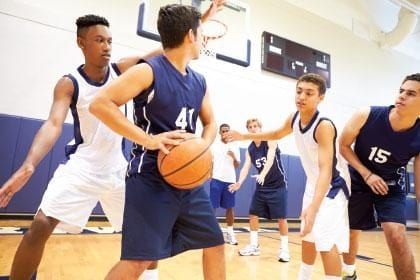
Why Sports & Smarts Go Together
Published: April 28, 2016
By: Claire Yezbak Fadden
It wasn’t until we were driving to the scholastic awards banquet that I realized my son, an all-star soccer player, wasn’t comfortable with another label that also characterized his accomplishments – honor student.
We were about to enter the dining hall where he, among 30 other seniors from his graduating class, were to be awarded their gold cords as lifetime California Scholarship Federation members. That’s when Shawn reluctantly told me he didn’t want to go.
“I won’t know anyone here,” lamented the 17-year-old. “This isn’t my group of friends. I won’t fit in.”
I attempted to ease his concerns by telling him that he had met the same criteria as all the other students at the banquet. It was then that I understood the bigger message Shawn was sharing – one that is believed by many people – the varsity soccer captain can’t also be an outstanding student. An athlete can’t also be a scholar.
But the partnering of commitment in the classroom and commitment on the playing field propels many teens to achieve excellence in all parts of their lives. It’s a winning combination. Being part of a team helps prepare students for life. When you’re part of a team, you’re automatically accepted by teammates. You’re a part of something bigger.
“Athletes learn goal setting for the group,” says Mary Blackman, former health and physical education coordinator for the San Diego Office of Education. “Some kids have difficulty accomplishing academic goals. But when they join a team, students learn how to set small measurable goals and meet those goals.
“They learn that practice does make a difference. Student athletes have to plan their time and be punctual. You don’t want to miss the team bus. All of these life skills carry over to the classroom,” she says.
Just where does this stereotype originate? The dumb jock. The computer nerd. A teen is either a serious student or a ballplayer – you can’t let anyone know that you want to be both. But why can’t the softball shortstop also get straight A’s? Can the kid who’s taking honors physics also be the varsity quarterback? Both of these scenarios and others can be achieved if we send our children the right messages. It’s not a choice between the two. Teens can excel at sports while also excelling academically. Parents should support both accomplishments.
Being involved in extra-curricular activities is an important part of the high school experience. It doesn’t matter if your student plays tennis, chess or the clarinet. School activities give students an opportunity to meet other teens they might not get to know otherwise. “The broader-based the team is, the better the experience will be for the student’s development,” adds Blackman. “Being part of a team helps break down the barriers. You spend time with people whose backgrounds are a bit different than yours.”
Nurture Your Student Athlete
The messages parents send their children have tremendous impact on them. If you have a teen who works hard in school and enjoys sports, here are some ideas to help you nurture her as both a student and an athlete:
- Focus on the Effort – Not every kid will be team captain, an honor student or MVP. That’s why it’s important that the message your child receives from you is that you’re proud of their efforts, both scholastically and athletically. School studies always come first and as long as your student is putting in their best effort, then they will receive the most benefits from their classes and their exposure to sports.
- Identity – Teens often fall into a labeling game: jock, smart kid, ballplayer, nerd. Help your child separate her identity from the things she does and the sports she plays. She should be able to see herself as someone who has many interests: Paula who plays field hockey, writes poetry and likes math. Her sole identity shouldn’t be tied into being the field hockey goalie.
- Stay in Balance – Don’t push your child to focus solely on sports. Student athletes must “make grades” (a C average in both academics and citizenship) to be eligible to play a high school sport. Assist your child in this balancing act. While you make certain she’s at practice on time and that she has the proper equipment, also check to see that homework assignments are done and school work is being kept up.
- Take Time for Fun – Teens will learn some great lesson and make life-long friends through their school activities. They also may need some help in fitting in fun. There are many demands on your teen’s time: practice, homework, school projects, part-time jobs and household chores. Help her carve out time for family events and an appropriate social life. Playing a board game with her brothers or working on a jigsaw puzzle with Dad will provide much-needed downtime. It can also give you an unstructured opportunity to talk.
Once inside the banquet hall, Shawn was surprised to see several of his good friends, including the class president and captain of the volleyball team. None of his pals, girls or boys, had talked about their academic accomplishments before the banquet. But all of them were there to receive their gold cords, and a handshake from the principal.
With proud, picture-taking parents in the audience, each student stood up to accept the award. One by one they shared their plans after high school. I watched as my soccer-playing scholar shared his college dreams. That’s when it occurred to me. He’s not a scholar or an athlete. He’s just another kid, doing what he loves to do.
Claire Yezbak Fadden is an award-winning freelance writer and the mother of three scholar athletes. Follow her on Twitter@claireflaire.
